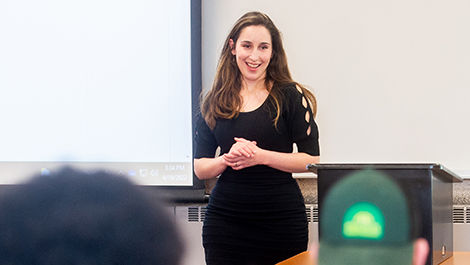BATTLE TESTED
Political science professor’s project tracks U.S. military interventions
By Brian Benson | October 13, 2022

DR. SIDITA KUSHI
Dr. Sidita Kushi’s groundbreaking research on U.S. military interventions is more than a scholarly project. It’s also a tool to help her Bridgewater State University students understand foreign policy and international relations.
Kushi led a team that developed the first comprehensive database of U.S. military actions abroad dating back to the country’s founding.
“This data allows me to show students a snapshot of how the U.S. has relied on military interventions,” said Kushi, an assistant professor of political science at BSU. “It helps them see why social scientists know what they know.”
Kushi, who began teaching at Bridgewater in 2020, worked on the database over the past four years through Tufts University’s Center for Strategic Studies, where she continues to serve as a non-resident fellow.
The project shows more military actions in recent decades, with more than a quarter of all interventions occurring since the end of the Cold War.
That is surprising because “it appeared we were in a relative era of stability,” she said. “We assumed the U.S. would possibly intervene less.”
The project goes beyond revealing the frequency of military interventions. It covers the motivations and outcomes of actions as well as human and economic costs. Kushi hopes it becomes a tool for scholars, policymakers and the public.
“I want to use the dataset to see when U.S. interventions have the greatest humanitarian outcomes,” she said. “When do these interventions create positive outcomes as opposed to negative outcomes?”
Assembling the data involved pouring over historical records, some of which were handwritten. Newer government documents are more readily available. But they lump military actions together in a way that forced Kushi and her team to disentangle one action from another.
“It feels like all those years have finally led to something concrete we can show to the general public,” said Kushi, who co-wrote an academic article in the Journal of Conflict Resolution to introduce the project. “I’m very glad to see the article out there. I’m even more happy to see it being accessed by a wide variety of people.”
The team hopes to update the data every few years. Kushi also aims to build a similar dataset for other countries, allowing researchers to make comparisons with the U.S.
In the meantime, she’s excited to continue discussing her work with BSU students.
“It’s a main reason I became an academic,” she said. “I really love … being able to share m
Do you have a BSU story you’d like to share? Email stories@bridgew.edu
